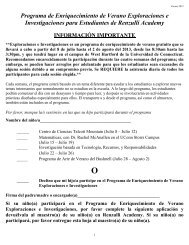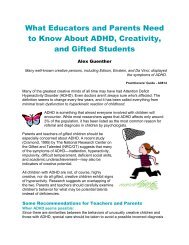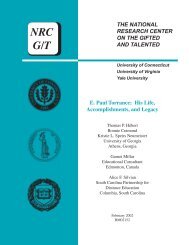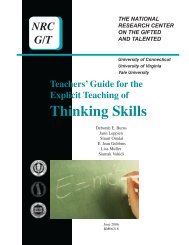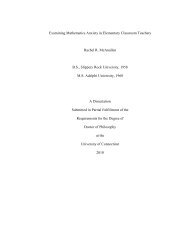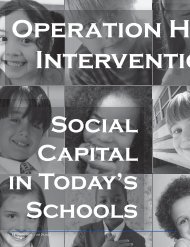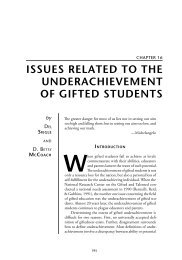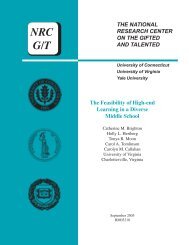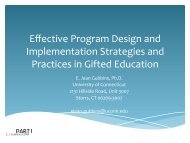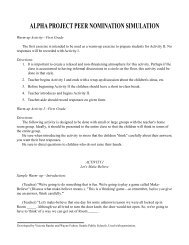Giftedness and High School Dropouts - Neag Center for Gifted ...
Giftedness and High School Dropouts - Neag Center for Gifted ...
Giftedness and High School Dropouts - Neag Center for Gifted ...
You also want an ePaper? Increase the reach of your titles
YUMPU automatically turns print PDFs into web optimized ePapers that Google loves.
3<br />
et al., 1991). Bachman, Green, <strong>and</strong> Wirtinen (1972) also indicated that the dropout<br />
decision is long in the making <strong>and</strong> is based on the students' personal background, traits,<br />
abilities, <strong>and</strong> school experiences. It is obvious that longitudinal data <strong>for</strong> gifted dropouts<br />
are necessary; however, it is not easy to gather these type of data about gifted dropouts.<br />
There<strong>for</strong>e, it is best to resort to nationally representative longitudinal data in<br />
researching this population. The National Education Longitudinal Study of 1988<br />
(NELS:88) data are a good source to address this issue because it is nationally<br />
representative longitudinal data that include a variety of personal, family, <strong>and</strong> school<br />
variables related to high school students' dropout decisions. In addition, the NELS:88<br />
data provide an opportunity to investigate not only the number of gifted students who are<br />
not completing high school, but what factors contribute either to the completion or<br />
dropping out of high school.<br />
The purposes of this study from NELS:88 data set were to gain comprehensive<br />
in<strong>for</strong>mation about gifted dropout students regarding (a) reasons <strong>for</strong> leaving school; (b)<br />
parents' reactions; (c) use of time; (d) future career plans; (e) relationships with parents<br />
<strong>and</strong> peers; <strong>and</strong> (f) self-concept. Data were also be used to compare gifted dropouts with<br />
gifted non-dropouts in terms of personal <strong>and</strong> educational factors related to gifted dropout<br />
students' decision to leave school.<br />
Research Questions<br />
Study 1: Analysis of Dropout Questionnaire<br />
1. What are gifted dropouts' reasons <strong>for</strong> leaving school, what are parents'<br />
reactions to their leaving school, what activities account <strong>for</strong> their time,<br />
what are their relationships with parents <strong>and</strong> peers, <strong>and</strong> what are their<br />
future career plans<br />
2. Is there any difference between gifted dropouts <strong>and</strong> non-gifted dropouts<br />
with respect to their plans to return to school<br />
3. Is there any difference between gifted dropouts <strong>and</strong> non-gifted dropouts<br />
with respect to self-concept <strong>and</strong> locus of control<br />
Study 2: Analysis of Student Questionnaire<br />
1. What are the descriptive characteristics of gifted dropouts regarding their<br />
personal background (SES, race/ethnicity, father's highest level of<br />
education, <strong>and</strong> mother's highest level of education)<br />
2. Are there any differences between gifted male <strong>and</strong> gifted female students<br />
who dropped out of school in terms of father's educational expectations,<br />
mother's educational expectations, student's educational aspirations,<br />
employment, pregnancy/child-rearing




